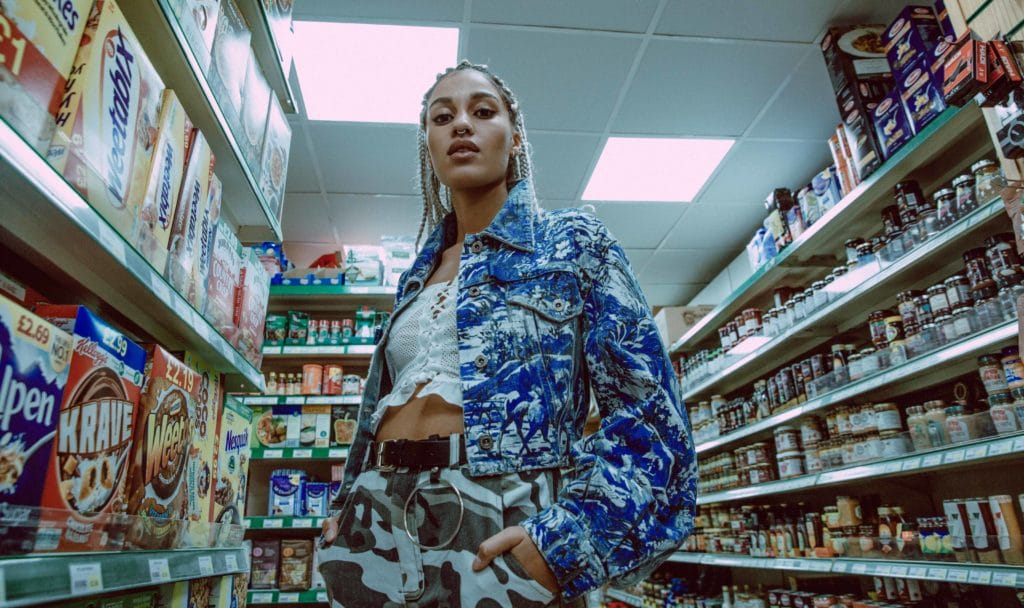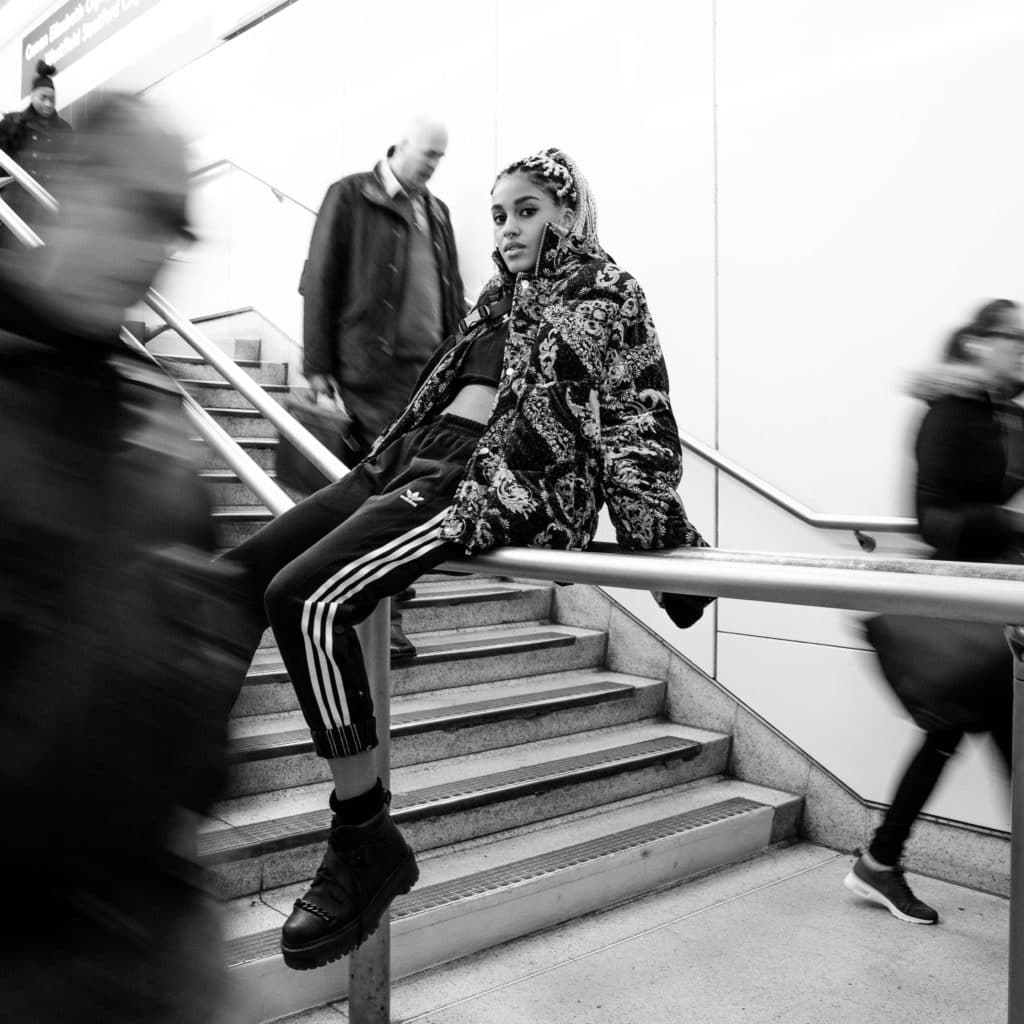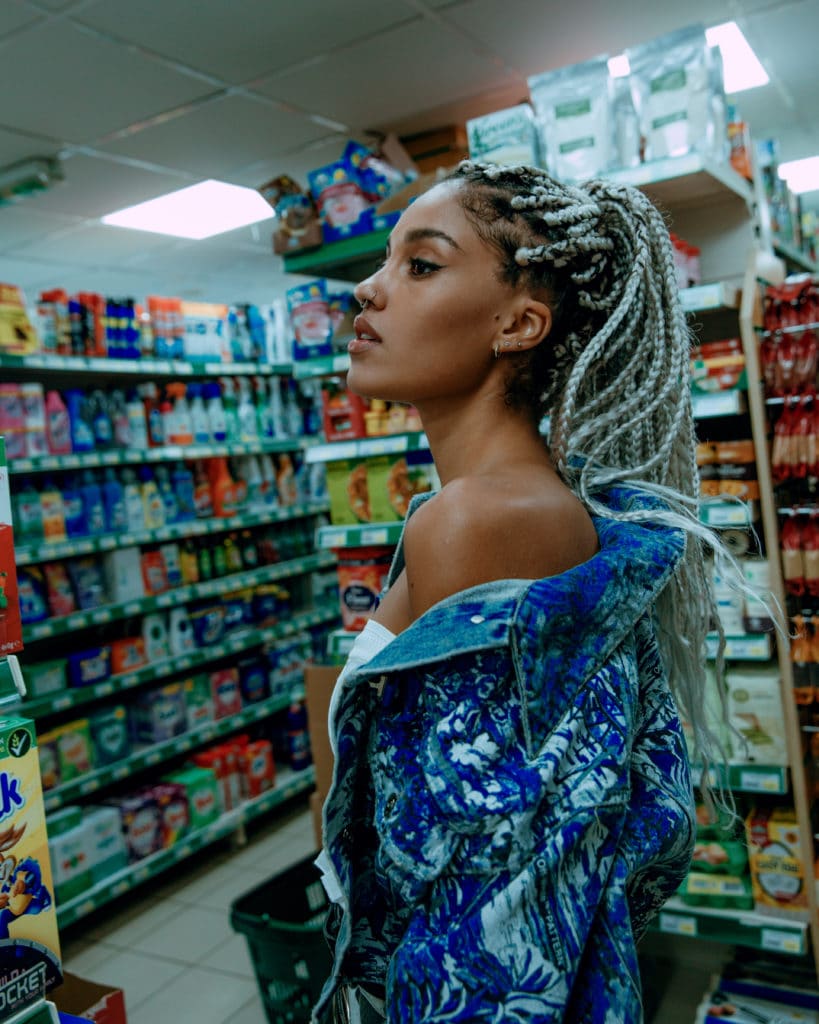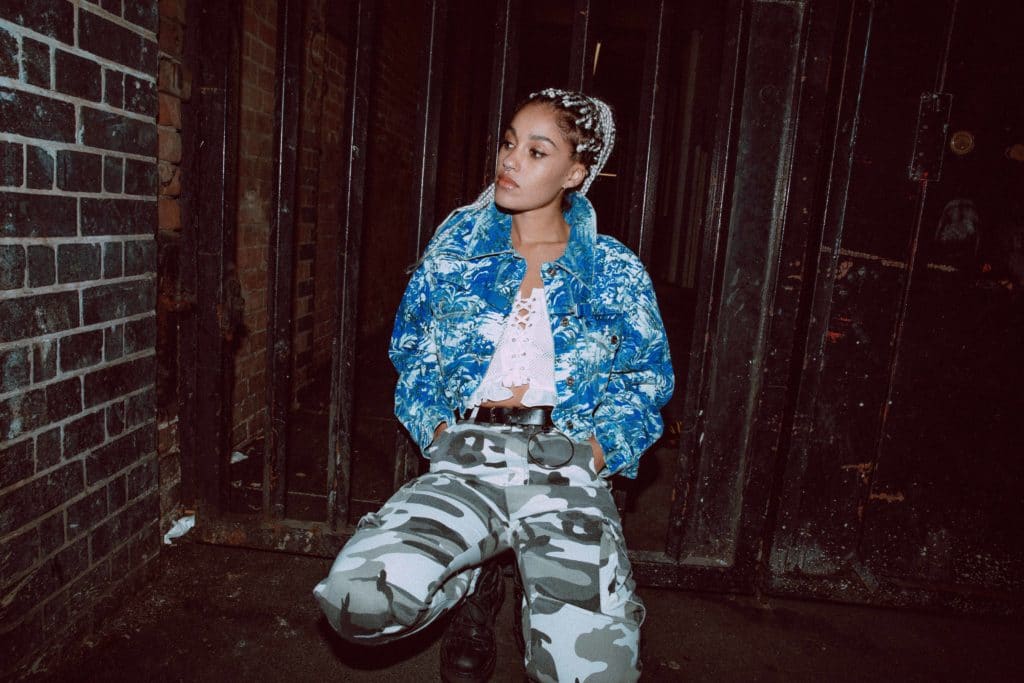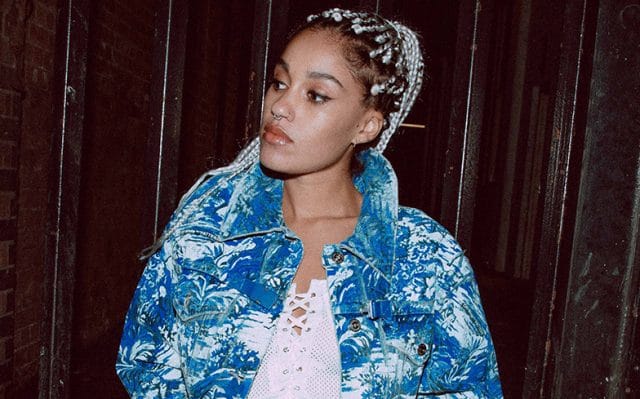
The rising singer-songwriter has lived in London for the past five years, and has made a name for herself in the queer and black communities with autobiographical songs such as pop anthem Nothing Matters and the alternative R&B jam All That (the latter of which is close to reaching 200,000 streams on Spotify).
Before then, Abisha grew up in a small town in Devon called Paignton (coincidentally, she used to live three minutes down the road from me), which she says was a struggle because of the lack of queer people in the county, especially queer people of colour. “I used to cry to my mum and beg her to straighten my hair, because I just wanted to look like everybody else,” she explains. “When I got to London, I felt free and I realised that I’m really not that different.”
Although living in Devon was the cause of a slight identity crisis for Abisha, she doesn’t want to be an artist who’s known for talking about her past hardships. Instead, she wants to be an inspiration for those who are experiencing a similar confusion, especially those in rural areas such as Paignton. In celebration of her upcoming appearance at Birmingham Pride, we spoke to the star about her coming out journey, her rom-com-esque initiation into the music industry, and the importance of showcasing diverse people from all backgrounds in mainstream culture.
How did you get into music?
I’ve done music my whole life. I went to theatre school, I went to dance school. When I get older, I was like, ‘Let’s get real. I’ll go to uni. It’s not attainable, I’m from Devon.’ So I went to uni, moved to London to go to Goldsmiths. My mum really wanted me to go there, she had Goldsmiths in her head, I think it was because she heard that one of the Royal Family had gone there! I left after a year, but on the day of my last exam, I went to the pub with my friends in Newcross, of all places! I was sitting at the bar with my friend and there was this old man stood at the bar next to me. I smiled at him, and he looked at me and said, ‘Hey sweetheart, do you sing?’ My housemate was like, ‘She does, she does! She’s really good.’ I sat down outside and he came out five minutes later with a tiny piece of paper with his name and number on it. He said, ‘I would love if you could give me a call, you can come down to the studio.’ Me and my friends then googled his name and he came up as a producer, and we wikipedia’d him and we were like, ‘He is legit.’ I called him the next day and then spent the next three months watching this other artist they were working with, as they were recording her album and rehearsing her live shows.
It’s like what you see in a rom-com? This actually happens to people?
Yeah! I used to read people’s autobiographies all the time, and I read Alesha Dixon’s once and it said she got scouted on a train. I was like, ‘These things aren’t real! They don’t happen. Nobody gets scouted on a train.’ My mum is very spiritual, she’s a medium, so I think my mum wanted me to go to Goldsmith’s for that reason… Because I wouldn’t have met Mike if I wasn’t going to Goldsmith’s, and going to that bar in Newcross at that time.
Were you inspired by any artists in particular growing up?
I didn’t listen to that much music growing up, which is weird because my mum didn’t really have music on around the house. But I went to dance school, so any music that I heard was pop music, so Britney Spears, Christina Aguilera… As I got older, I explored artists and decided to teach myself how to play guitar. That was the time that I got into listening to people’s albums – I was obsessed with Jessie J at one point and her first album was the soundtrack to my early teens. My music tastes then expanded!
The video for your most recent single, Confused, was very diverse – was that important for you to do?
Definitely. That song is so personal and I wanted to get across exactly what it meant to me. It was so important to showcase other gay couples, sexualities and races. That’s what I want to do. I want to be inclusive. It was my first video that wasn’t just me in a studio, it was the first video where I was able to have other people in it with me, so to have my partner in it, was as real as it can get. The song is talking about my experience, but I also wrote it because it’s so relatable, whether it’s about your partner struggling to come out or they don’t know where they stand with their loved one. I wanted to put it across in as many ways as possible. I’m trying to reach out to people who do feel different and make them feel like they belong.
You said your partner was in the video – may I ask how you identify?
I identify as gay. I had a boyfriend for two years when I was younger. But since I was 17, I’ve been out as gay. I loved him, but afterwards I realised that he was my best friend. Nothing more than that. After that, I looked at girls and thought they were really cool? [Laughs] I didn’t know it straightaway. Looking back, I could see things throughout my whole life and childhood that made me realise that I actually had a crush on a particular person, but at that point you just don’t understand it. When I grew up, I idolised women in the music industry like Billie Piper – I had such a crush on Billie Piper. It took me so long to realise because there were no other gay people around me. Now, people are so lucky growing up because there’s more of it in the media, everyone knows somebody whether it’s a family member or a family friend who is gay now. Even ten years ago, or five years ago, when I was a teenager, that wasn’t the case. Now, it’s becoming so much more open. If it was like that when I was growing up, I probably would’ve realised it sooner, because I had no point of reference.
So was growing up in Devon hard for you as a queer person of colour?
The racial thing was more of an issue growing up for me than my sexuality. My sexuality was a lot later, but from as early as I remember, I was always conscious that I was different. I started dancing when I was two-years-old and I grew up in my dance school. I was there three-nights a week, weekends, and I was just looking into a mirror. It makes you so aware that you’re different to everyone around you. I’m stood there with my brown skin and my afro, and all my friends are white with blonde hair. When you’re a kid, you’re even more aware that you’re different. So I think, from such an early age, I felt that. I just wanted to be what I thought was normal. I didn’t know anybody else that was mixed race and I didn’t have any mixed race role models. I didn’t grow up with my dad because he lives in London and until the age of seven, he wasn’t really in my life. I think if I had grown up with my dad, it would’ve been a different story, but I grew up with my mum who is white, so I was the odd one out. That was the same story at school, I was the only mixed race person… As a child, it was hard. It probably manifested later on in life, I used to cry to my mum and beg her to straighten my hair, because I just wanted to look like everybody else. When I got to London, I felt free and I realised that I’m really not that different, there are so many people that are like me, and if I had grown up on London, I never would’ve felt that. Even coming to London, I worked at Urban Outfitters for three years, and because I’m from Devon, other mixed-race people that I work with would be like, ‘You’re so white’. How I spoke, wasn’t how mixed-race people speak, and they thought I sounded posh, which I’m so not. My accent wasn’t London. I went from people in Devon saying ‘You’re so black’ to being in London – where people finally look like me – telling me I’m ‘so white’. It’s kind of hard to find an identity. Do I even know who I am? Because I’m white and I’m black, but I’m apparently neither white or black. Now I’m more confident, but I wouldn’t say I 100% know who I am. It’s going to take me a long time. Music is part of that journey. It’s helping me get there. Being in London is also helping that, and becoming closer to my dad and his other family. I didn’t know that I had six half-siblings until I was 11.
How did you feel when you found out about your dad’s family?
I always wanted to know them growing up, because I was an only child. Again, if I had a sister or a brother I would’ve felt less different. When I found out, I was like, ‘That’s amazing. I’ve always wanted siblings. Am I ever gonna know them?’ I’m now 24 and I’ve only just had contact in the last year with the oldest half-sibling. She reached out to me last year and said, ‘I would love to have a relationship with you.’ That was amazing for me, and she had a baby six months ago, so now I have a sister and a nephew that I never thought I’d have.
You’ve really had a journey from Paignton to here…
When I go back home to Devon and walk down the street, people will still look at me, and on the rare occasion where I will walk past another black person, they smile or nod. It’s like a nod of respect, that we’re both in this town, we’re family because nobody else is like us.
I think it’s great that you’re talking about these issues in Devon, because people don’t realise the struggles queer people, let along queer people of colour have there.
It’s so rare to meet somebody else from Devon. Obviously, you understand but a lot of people have no idea. Especially people from cities. It’s so bizarre for them to think that some people grow up without being surrounded by other diverse people. My girlfriend for example, she grew up in Manchester City, and she says she was the minority in her school, everyone else was Asian or black. There was less white people, so it’s bizarre for her to know that I grew up in a place where people didn’t know about other races. I can go home for a weekend and not see a single black person. It’s really important to see gay and black people in the media and in culture, because that’s how people growing up in smaller places will know that there’s another world out there. When I was younger, my cousin had a party at my aunties house and my dad stayed over on the sofa. My cousin went downstairs in the morning to go and watch TV, and ran back upstairs screaming, ‘There’s a gorilla on the sofa.’ She was three and had never seen a black person before. You can’t even blame the kid, they haven’t even see a black person because they weren’t on TV, they weren’t in the media, they didn’t have black role models or black people integrated into their lives.
Do you think we’ll hear some of your past experiences in Devon on your upcoming album or EP?
Yeah. It’s something that I’ve wanted to write about for a long time but never really known how to. I don’t want to be an artist who sings about struggles they’ve had growing up, because I wouldn’t really call them struggles. I have obviously struggled a bit with identity and feeling different my whole life, being black and gay in Devon, which is largely white and straight. I want to get to a place where I’m comfortable with it, and out the other side of it. I want it to be about my story, rather than ‘Poor me, I’ve had this struggle.’
Is it important for you to tell your own story through your songs?
Yes. I don’t actually think I can be an artist who releases songs I haven’t written. It wouldn’t feel sincere, it wouldn’t feel like I’m being me. I loved writing growing up, I used to write poems from a really early age, and enter poetry competitions! That developed when I was in school to writing songs. I would sit in the computer room and type up songs and then go out to play with the normal people. For me, it’s the way I express how I’m feeling, and it’s the most amazing way to deal, but it’s hard for me to write about a song until that particular situation is resolved. If I write a song about it, it’s closure.
You’ve released a really diverse mix of singles – can we expect an EP or an album to follow?
I’m planning on releasing another single followed by an EP. That’s my plan. Like you said, everything that I’ve put out so far has been completely different. I wanted to show that I can be a diverse artist and I can do more than one genre. It was also more the fact that it’s my journey. All That was one of the first songs I ever wrote, and it was literally one of the most personal things I’ve ever gone through. I was in a horrible situation – which makes me song like a complete dick! – where I had to choose between two people. I sat and wrote these paragraphs, went into the studio the next day and it just came. After that, I wanted to do something completely different and out of the box. Nothing Matters was a bit more poppy – it’s not my favourite of my songs that I’ve written.
Does it not feel authentic to you?
No. My vibe isn’t really pop. But I was like, ‘Yeah, I wanna show that I can do it.’ Looking back, I don’t love the song, but what the song’s about is real. It’s part of the journey, again. Confused is probably the most me. I think Confused and All That tie together pretty well. And on my EP, the vibe will be like those songs. I’m just really excited to solidify a genre. My music is often described as alternative R&B, which I love, but I also don’t want to a pop artist, an R&B artist, a this artist, I don’t wanna necessarily fit into a genre.


